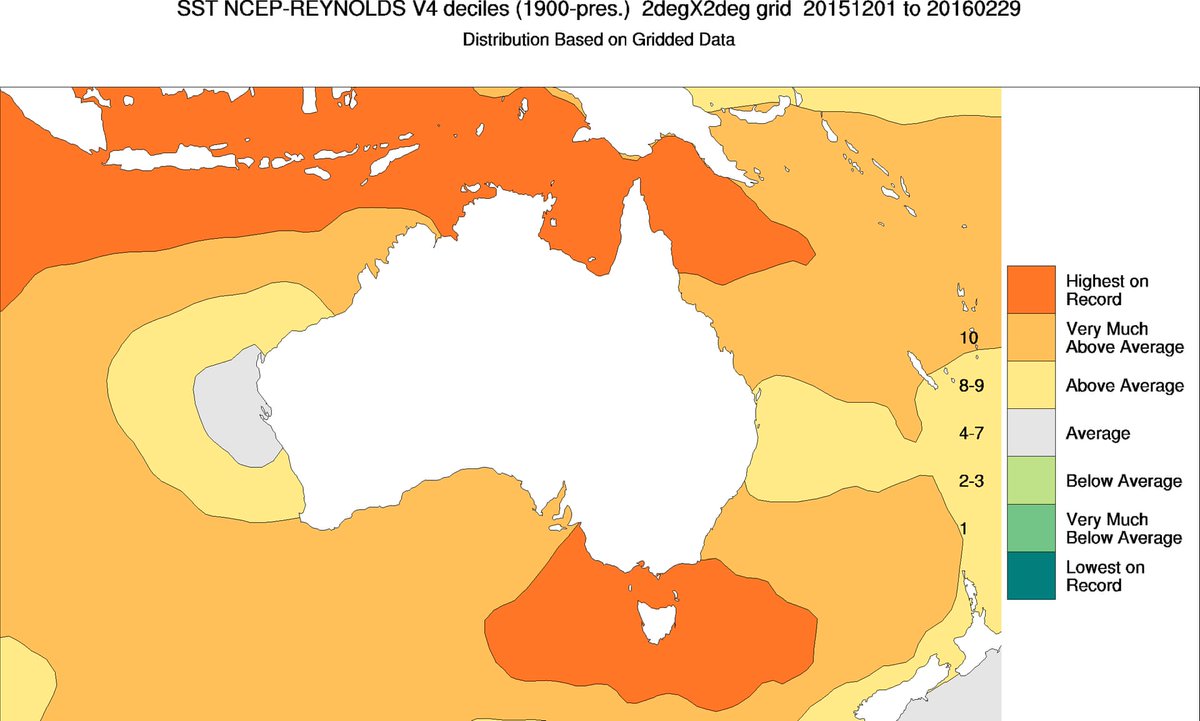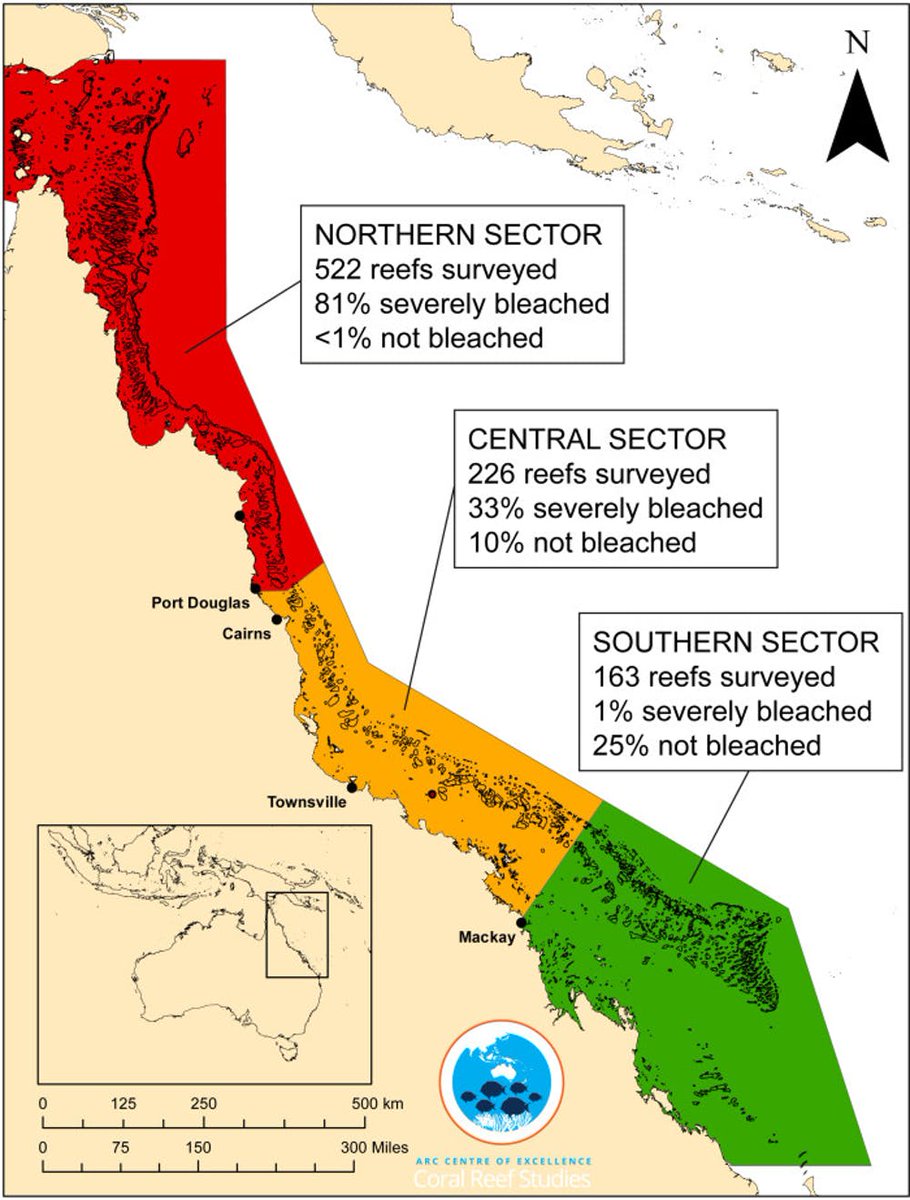The Great Barrier Reef will be dead by 2029, with catastrophic consequences for all life on Earth.
[THREAD]
[THREAD]

'Terrifying':
🔥 2°C of global warming (2029 - 2039) means the destruction of 99% of the world’s tropical reefs.
🔥 Even at 1.5°C (2023 - 2028) 70-90% will die.
Overfishing & pollutants from agriculture, which are also killing the Reef, are 'escalating'.interactive.carbonbrief.org/can-great-barr…
🔥 2°C of global warming (2029 - 2039) means the destruction of 99% of the world’s tropical reefs.
🔥 Even at 1.5°C (2023 - 2028) 70-90% will die.
Overfishing & pollutants from agriculture, which are also killing the Reef, are 'escalating'.interactive.carbonbrief.org/can-great-barr…
Terrifying consequences.
"You like to breathe?"
⚠️ 85% of oxygen humans breathe comes from the Ocean - we need healthy reefs to survive.
⚠️ Rippling ecosystem collapse
⚠️ 50% of world's coral now dead due to sea floor dredging, pollution, & emissions.businessinsider.fr/us/coral-reefs…
"You like to breathe?"
⚠️ 85% of oxygen humans breathe comes from the Ocean - we need healthy reefs to survive.
⚠️ Rippling ecosystem collapse
⚠️ 50% of world's coral now dead due to sea floor dredging, pollution, & emissions.businessinsider.fr/us/coral-reefs…
Will the Great Barrier Reef really be dead as early as 2029?
Yes. See this thread on likely temperature rise.
Anyway, it's not just climate:
'By 2025, ...15.7 billion plastic pieces could come into contact with coral reefs.'
blogs.ei.columbia.edu/2011/06/13/los…
x.com/ClimateBen/sta…
Yes. See this thread on likely temperature rise.
Anyway, it's not just climate:
'By 2025, ...15.7 billion plastic pieces could come into contact with coral reefs.'
blogs.ei.columbia.edu/2011/06/13/los…
x.com/ClimateBen/sta…
I'm probably guilty of downplaying the ecological emergency when I say 2029.
See this thread on (amongst other things) Coral Reef calamity by 2025.👇
See this thread on (amongst other things) Coral Reef calamity by 2025.👇
https://x.com/ClimateBen/status/1159581754933555202?s=19
'It is well known in climate science that, even if we stopped harmful emissions tomorrow, global warming would not peak for another several decades. By then, most of the Reef will be long gone.
The argument is simple...the conclusion difficult to avoid'independentaustralia.net/environment/en…
The argument is simple...the conclusion difficult to avoid'independentaustralia.net/environment/en…
“I dread to think that it might be as soon as next year":
"The problem with a 10-year window that’s required for a decent recovery is that the chances of us having a fifth bleaching event in that time period is actually very high because of global warming"mobile.abc.net.au/news/2018-08-2…
"The problem with a 10-year window that’s required for a decent recovery is that the chances of us having a fifth bleaching event in that time period is actually very high because of global warming"mobile.abc.net.au/news/2018-08-2…
'Irreversible damage to the Great Barrier Reef by 2030 unless immediate action is taken', marine scientists warned in 2014.
Urgent, radical action was required 35 years ago.
⚠️ 160 billion tonnes of CO2 emitted since 2014, and emissions are accelerating.
dailymail.co.uk/travel/article…
Urgent, radical action was required 35 years ago.
⚠️ 160 billion tonnes of CO2 emitted since 2014, and emissions are accelerating.
dailymail.co.uk/travel/article…
Professor Ove Hoegh-Guldberg, who worked on the new research paper, said it confirmed what he predicted back in 1999, when he controversially forecast the loss of reefs on the Great Barrier Reef by 2040.
His old predictions now appear to be conservative.
news.com.au/technology/env…
His old predictions now appear to be conservative.
news.com.au/technology/env…
The 2016 bleaching event was unprecedented in scale and severity:
'some of the headlines it has generated are factually incorrect or misleading...'
The wider truth: state-corporate media downplay ecological catastrophe and keep it off the front pages.
theconversation.com/great-barrier-…
'some of the headlines it has generated are factually incorrect or misleading...'
The wider truth: state-corporate media downplay ecological catastrophe and keep it off the front pages.
theconversation.com/great-barrier-…

The opening image is from here:
theguardian.com/environment/pl…
State-corporate media, **@guardian included**, are the key reason for inaction.
If the public aren't allowed to grasp the severity of the ecological crisis, they won't try to force system change:👇
x.com/ClimateBen/sta…
theguardian.com/environment/pl…
State-corporate media, **@guardian included**, are the key reason for inaction.
If the public aren't allowed to grasp the severity of the ecological crisis, they won't try to force system change:👇
x.com/ClimateBen/sta…
Increasingly frequent marine heatwaves can lead to the almost instant death of corals, scientists working on the Great Barrier Reef have found.
These episodes of unusually high water temperatures are - like land heatwaves - associated with climate change.bbc.com/news/amp/scien…
These episodes of unusually high water temperatures are - like land heatwaves - associated with climate change.bbc.com/news/amp/scien…
🌡️Back-to-back marine heat waves killed half the Great Barrier Reef in 2016 & 2017.
🌡️Extreme marine heat waves - which will be more frequent, larger, more intense, and longerlasting - are 'just around the corner'.
sciencemag.org/news/2019/01/o…
🌡️Extreme marine heat waves - which will be more frequent, larger, more intense, and longerlasting - are 'just around the corner'.
sciencemag.org/news/2019/01/o…
The Great Barrier Reef's inexorable demise appears to confirmed by official assessments:
'In decades to come they will probably still contain some corals, but ecologically speaking they will not be growing, or even functioning.'
theconversation.com/this-situation…
'In decades to come they will probably still contain some corals, but ecologically speaking they will not be growing, or even functioning.'
theconversation.com/this-situation…
• • •
Missing some Tweet in this thread? You can try to
force a refresh





